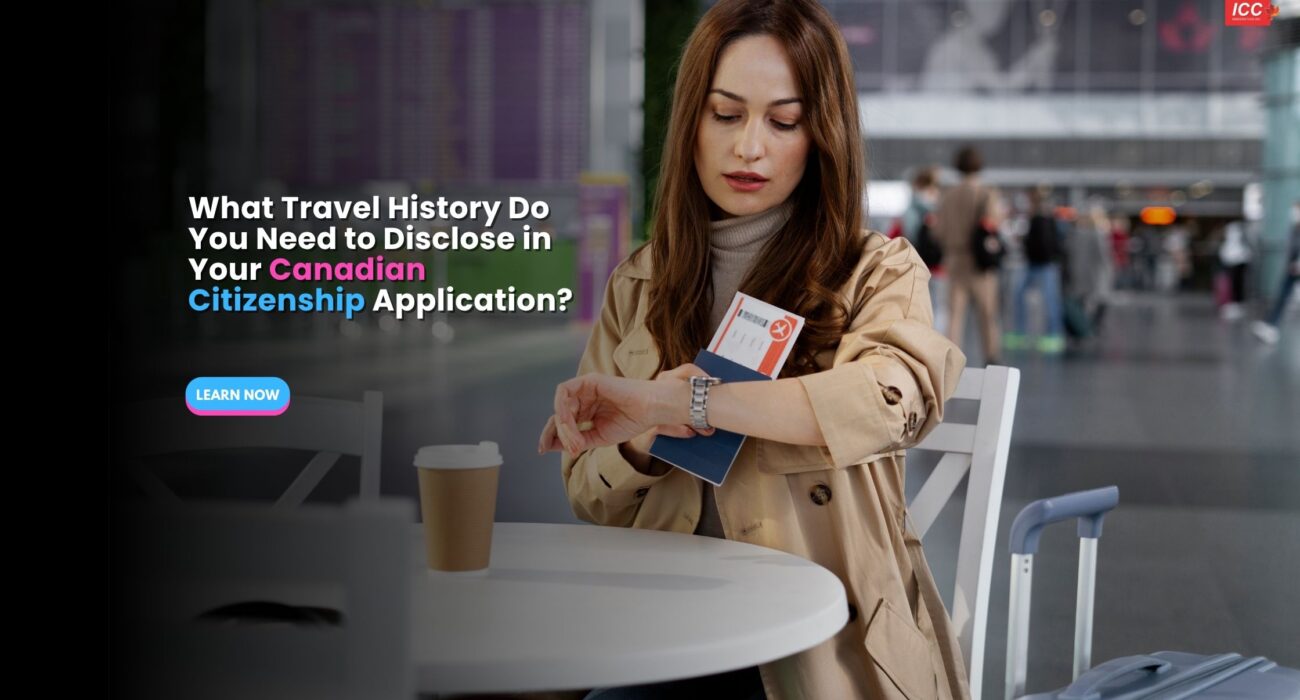Applying for Canadian citizenship is an exciting milestone—but it’s also a process that requires careful attention to detail. One of the most common sources of confusion among applicants is the travel history section of the application. Many believe they only need to include travel details for the past few years, but in reality, Immigration, Refugees and Citizenship Canada (IRCC) requires a complete lifelong travel history — covering every country or territory you have visited since birth.
In this guide, we’ll explain what travel history you must include, how to gather it efficiently, and how ICC Immigration can support you through your Canadian citizenship or Permanent Residency (PR) journey.
🧳 What Travel History Must You Include?
When completing your Application for Canadian Citizenship (CIT 0002)—whether online or on paper—you’ll be asked to disclose your travel and immigration history under question 13. According to IRCC, applicants must report:
✅ All countries and territories visited since birth – even if the visit lasted just a few hours, such as a layover.
✅ Start and end dates of each trip.
✅ Type of immigration status held during your stay (e.g., visitor, student, worker, or citizen).
For example, if you had a brief airport layover in Dubai or London during an international flight, you must still list that visit with “visitor” as your status and the same entry and exit date.
Failing to include all travel details—or providing incomplete information—can lead to application delays or requests for additional documents.
🌍 What Counts as “Immigration Status”?
Many applicants assume that only long-term statuses like study permits or work visas are relevant. However, IRCC requires disclosure of all statuses, including:
-
Visitor or Tourist
-
Temporary Resident (Study/Work)
-
Permanent Resident (in any country)
-
Citizen (if holding multiple citizenships)
-
Other statuses, which can be specified using the “Other” field in the form
This ensures that IRCC has a complete picture of your global mobility and residency history.
🧾 How to Compile a Complete Travel History
Reconstructing your entire travel history since birth may sound overwhelming—but it’s manageable with a systematic approach. Here’s how to do it efficiently:
1️⃣ Review Current and Expired Passports
Your passport stamps are a great starting point. Each stamp often includes entry and exit dates that help you track your travels. Note that not all countries stamp passports on exit, so use them as a reference rather than your only source.
2️⃣ Search Your Email for eTA or Visa Confirmations
If you have traveled to visa-exempt countries, search your email for electronic travel authorizations (eTA) or visa approvals. Keywords like “eTA,” “visa approval,” or the destination country’s name can help locate old records.
3️⃣ Check Airline and Hotel Bookings
Old flight itineraries, hotel reservations, or even Airbnb confirmations often include exact dates and locations. Many airlines also maintain travel history archives if you used the same account frequently.
4️⃣ Use Social Media and Photos
Social media platforms like Facebook, Instagram, or X (Twitter) can jog your memory. Photos have timestamps that can confirm when and where you traveled. Even photo albums or cloud storage (like Google Photos) can be valuable tools.
5️⃣ Review Credit Card and Bank Statements
Transactions from hotels, restaurants, or currency exchanges can reveal the timeframe and destination of past trips.
By combining these resources, you can create a comprehensive and accurate record of your travel history to include in your Canadian citizenship application.
⚠️ Why Accurate Travel Disclosure Matters
IRCC uses your travel history to verify your physical presence in Canada, a key eligibility factor for citizenship. Any discrepancies or omissions could lead to:
-
Processing delays
-
Requests for clarification or additional documents
-
Possible refusal if the information is found inconsistent
Being thorough and transparent not only speeds up your application but also strengthens your credibility as an applicant.
💡 Pro Tip from ICC Immigration
Before submitting your application, review your IMM 5669 (Background/Declaration Form) or any previous visa applications you’ve submitted to Canada. Ensuring consistency between forms helps avoid confusion or red flags during processing.
🌟 How ICC Immigration Can Help You Secure Your Future in Canada
At ICC Immigration, we understand that navigating Canadian immigration laws and documentation requirements can be complex and overwhelming. Our team of regulated immigration experts ensures that your citizenship or PR application is accurate, compliant, and complete.
Here’s how we can assist you:
✅ Permanent Residency Applications
Whether through Express Entry, Provincial Nominee Programs (PNPs), or family-based sponsorships, ICC Immigration helps you choose and complete the right pathway to Canadian Permanent Residency efficiently.
🎓 Work Permits and Study Permits
We assist clients in obtaining temporary status in Canada—such as study permits or work permits—which can later transition into Permanent Residency.
👨👩👧 Family Sponsorships
If you have loved ones in Canada, our experts can help reunite your family under spousal, parent, or dependent sponsorship programs.
⚖️ Expert Legal Guidance
Immigration laws are constantly evolving. Our legal specialists ensure that your application complies with IRCC’s latest policies and travel disclosure requirements, minimizing risks of refusal or delay.




